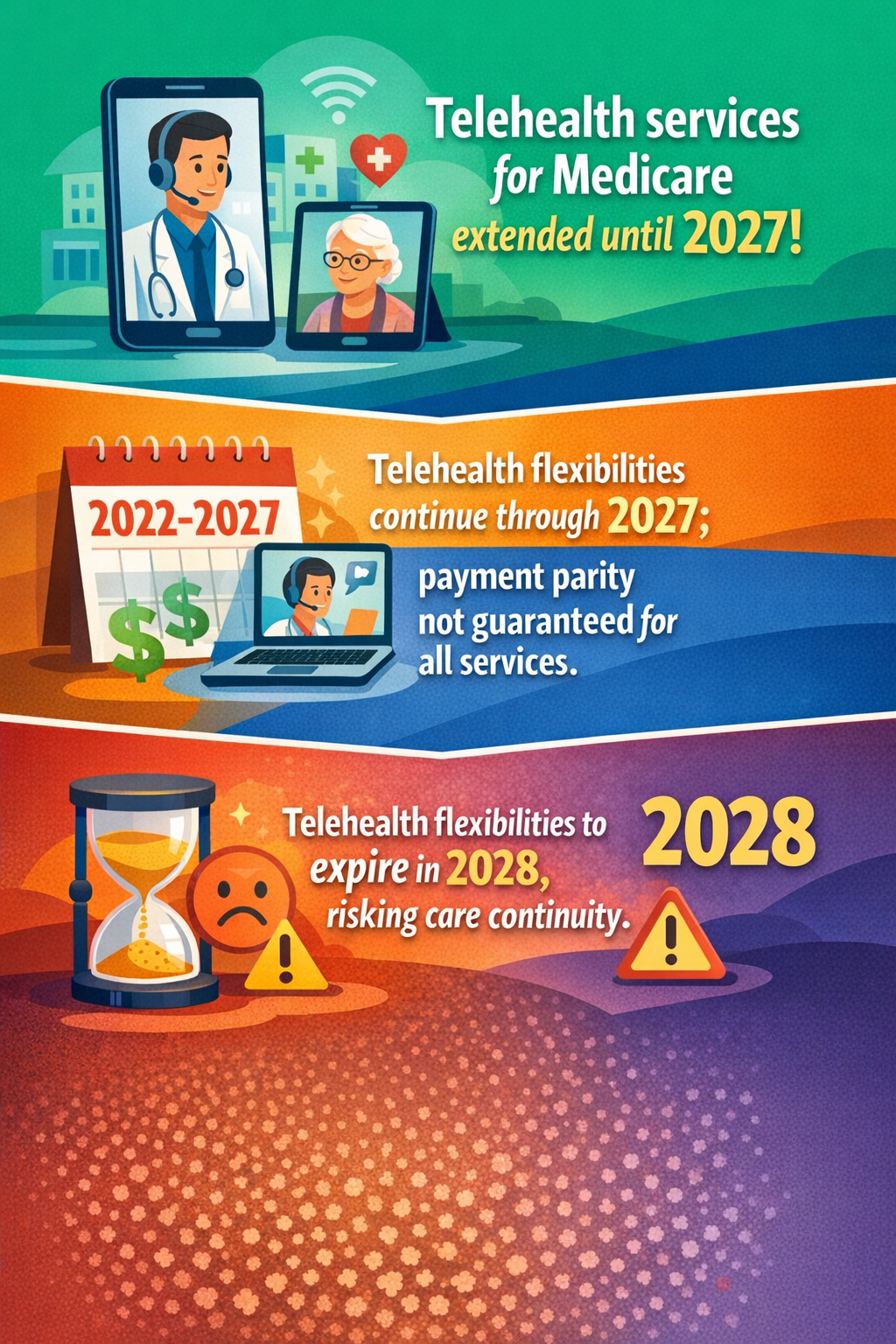The Emerging Fragility of Telehealth Policy: A Weak Signal with Disruptive Potential
Telehealth has rapidly evolved as a core component of healthcare delivery since the onset of the COVID-19 pandemic. However, the impending expiration and gradual rollback of federal telehealth flexibilities, starting in 2028, represent a weak signal that could disrupt healthcare consumption, reimbursement models, and access equity. This shift, coupled with uneven payment parity and new in-person visit requirements, introduces uncertainty across multiple industries reliant on telehealth technologies and services. Understanding this unfolding policy landscape and its ramifications is essential for businesses, government agencies, and healthcare providers to anticipate and adapt to potential systemic disruptions.
What's Changing?
Since the pandemic accelerated adoption of telehealth, regulatory adjustments expanded Medicare and private payer coverage for virtual care. These changes removed geographic barriers and originating site restrictions, easing patient access to remote healthcare services. Telehealth flexibilities have been extended several times through 2027, as noted by multiple sources, enabling health systems to expand virtual offerings (Becker's Hospital Review; source).
Despite these extensions, some policy shifts underline emerging fragility:
- Payment Parity Concerns: While Medicare temporarily maintained coverage, payment parity—meaning virtual visits are reimbursed at the same rate as in-person visits—is no longer guaranteed for every telehealth service (source).
- Expiration of Flexibilities in 2028: Many emergency telehealth flexibilities are set to expire after 2027, notably requiring new mental health telehealth patients to have in-person visits before continuing virtual care. This change may reduce convenience and access for patients accustomed to remote options (source).
- Geographic and Originating Site Reinstatements: Some geographic restrictions and originating site requirements for Medicare telehealth services may be reinstated, reversing earlier expansions that allowed broader remote care (source).
Meanwhile, investments in telehealth-enabled technologies, AI-assisted virtual care, and chronic disease management are expected to grow, supported by the expanding healthcare predictive analytics market projected to rise drastically by 2034 (source).
These regulatory shifts reflect a tension between rapidly innovating technological capabilities and a conservative, evolving policy framework that may retract hard-won gains in telehealth accessibility and reimbursement.
Why is this Important?
The approaching rollback of telehealth flexibilities constitutes a weak signal with the potential to disrupt healthcare delivery on multiple fronts:
- Access to Care Risks: New in-person visit requirements and reinstated geographic restrictions could disproportionately affect rural, underserved, and mobility-challenged populations, increasing barriers to timely care (EurekAlert; source).
- Financial Impacts on Providers and Patients: Without payment parity, providers may reduce telehealth offerings or increase out-of-pocket costs, potentially reversing cost savings realized during the pandemic and limiting telehealth scalability (source).
- Technology Investment Uncertainty: Health systems and technology vendors may face hesitation or reduced capital flows for telehealth innovations amid unclear long-term reimbursement and regulatory frameworks (TechBullion; source).
- Fragmentation of Care Models: The inconsistent return of pre-pandemic telehealth restrictions risks fragmenting care strategies, adding administrative burdens and complicating patient engagement (Matreatment; source).
Collectively, these developments indicate that while telehealth remains integral to healthcare, its future structure may shift significantly. This creates uncertainty not only for healthcare but also for sectors dependent on telehealth-enabled supply chains, data analytics, and patient monitoring.
Implications
Organizations across healthcare, technology, insurance, and public policy should recognize this weak signal as an emerging disruptive factor influencing future strategy:
- Strategic Planning for Policy Shifts: Providers and payers may need to develop flexible service delivery models able to pivot between telehealth and in-person care rapidly, ensuring compliance while maintaining access and patient satisfaction.
- Investment in Hybrid Care Technologies: Innovation in hybrid platforms that integrate virtual care with efficient in-person components could reduce friction imposed by regulatory in-person visit mandates.
- Advocacy for Permanent Telehealth Solutions: Industry stakeholders might intensify efforts to influence legislation toward establishing permanent, equitable telehealth reimbursement policies.
- Data-Driven Risk Modeling: Using predictive analytics to anticipate patient populations most vulnerable to disruptions in telehealth access could guide resource allocation and targeted interventions.
- Cross-Sector Collaboration: Partnerships between technology firms, healthcare providers, and regulators may accelerate development of secure, compliant telehealth infrastructures adaptable to evolving regulations.
Failing to address these dynamics proactively could result in setbacks in care accessibility, increased costs, and slowed adoption of emerging health technologies, undermining health outcomes and economic efficiencies.
Questions
- How can organizations design telehealth programs resilient to policy reversals or restrictions?
- What data and analytics capabilities are needed to model the financial and clinical impact of changing telehealth regulations?
- In what ways can public-private partnerships advance a stable and equitable telehealth reimbursement framework?
- How might hybrid care delivery models evolve to satisfy regulatory requirements without compromising patient experience?
- What are the risks and opportunities for telehealth technology firms as payment parity becomes less certain?
Answering these questions will be central to shaping sustainable telehealth ecosystems capable of withstanding regulatory volatility over the next decade.
Keywords
telehealth; payment parity; Medicare regulations; healthcare policy; hybrid care; healthcare predictive analytics; chronic disease management; AI in healthcare
Bibliography
- Health systems to expand telehealth after 2-year Medicare extension. Becker's Hospital Review.
- Telehealth in 2026: Why some virtual visits now cost more. Saving Advice.
- What changed in Medicare telehealth under the 2026 spending bill. Medical Economics.
- Telehealth flexibilities will expire in 2028, risking sudden lapses in care. EurekAlert.
- The integration of artificial intelligence in health tech systems. TechBullion.
- Global healthcare predictive analytics market forecast to 2034. Citrusbug.
- Addiction treatment 2026 explained: Telehealth’s evolving role. Matreatment.
- Telehealth flexibilities reinstated through January 2026. TechTarget.

